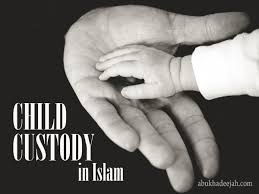
Week 10: Hazanat/ Custody of Children
Child custody arises as a burning issue after every divorce in Pakistan, which makes both parents know about child custody laws. Each parent seeks every kind of legal provision to gain custody of their child even though being a single parent is tough.
Child welfare is the key factor taken into consideration by the court while granting custodial rights to any parent. Thus, aspects such as financial stability of parent, reported misconduct, character, and capacity of parent are given importance.
The courts grant physical rights to one parent, however increased number of cases have seen shared legal responsibility and guardianship of any child(ren). Thus custodial laws in Pakistan can also be classified as physical and legal.
According to the judicial system established in Pakistan, the legal right over minors implies that the parent is solely responsible for the welfare of the juvenile in question.
While dealing with such issues, the court considers the preference of the minor in question, if he/she is old enough to form an intelligent preference.
Traditionally in Pakistan, mothers were given ownership of minor, but the trend has been showing signs of change. More and more women are opting for career-driven lives, which may not enable them to bring up their children as a single parent.
LEGAL AGE OF CHILD CUSTODY AFTER DIVORCE
In Pakistani Laws the custody of a minor is given to the mother, this right is called the right of hizanat. But after the age of seven years, the mother’s right over the son ends however it is not an absolute right; it is made in the interest of the boy. Girls are given to mothers until they attain puberty. One important aspect of this law is that the conduct of the mother is of great importance, and if that is found ‘objectionable’, she may not be given custody rights. The father has the right to custody after the mother’s term ends by the court of law. In case of the absence of both parents, the grandparents are offered custody of the child.



